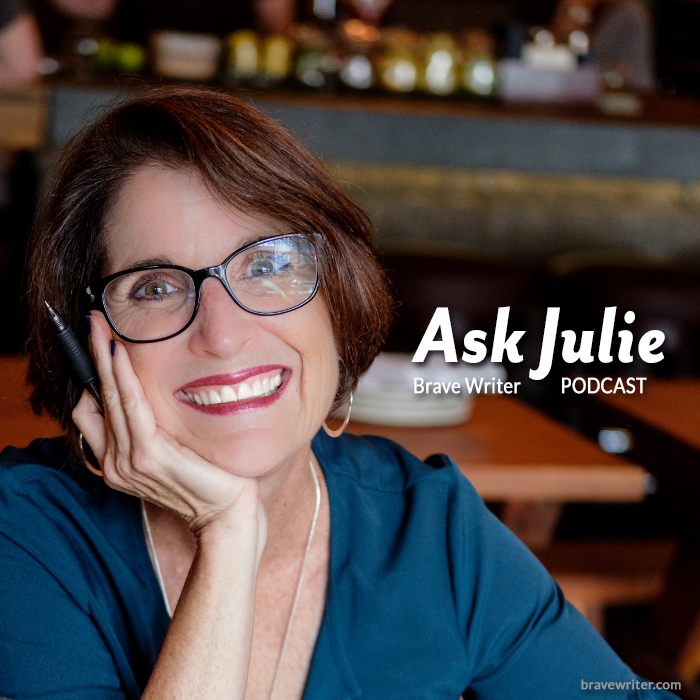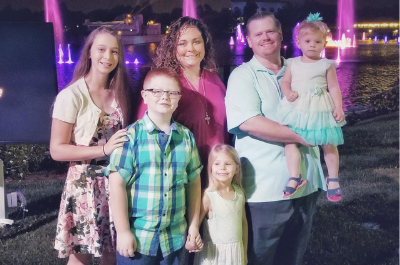Brave Writer Podcast: Breaking Free from Multitasking with Courtney Moyer

Do you spend your waking hours multitasking, only to end the day exhausted, wondering what you accomplished? Discouraging, right?
Today’s podcast guest of honor, Courtney Moyer, wrote to me asking, “Julie, how do I multitask while teaching multiple children at multiple levels with multitudes of housework?”
I’ve been there! I remember the shoes scattered down the hallways, math books lost under the couch, and the crying baby who needed me to stop everything to breastfeed. Homeschooling can feel like it’s at the bottom of the list when your LIFE is so demanding!
I’d like to help you get out of this rut. Ready? First suggestion: Stop Multitasking!
Ha! Let’s talk about how to end the madness and find peace and progress in the middle of the muddle.
First, let’s explore my favorite maxim: “Less is more.” How will this shift in how you live and think change your life?

Listen to today’s episode to learn:
- How multitasking affects your brain in negative ways
- Why you need to shift to a “less is more” mentality
- Ways to immerse yourself into your homeschool to boost productivity
- How to personalize the learning adventure for your children AND for yourself
Make sure you listen to the recap at the end to hear how Courtney incorporated my advice. She did such an incredible job! Now Courtney approaches learning with a fresh, positive perspective and bubbly enthusiasm! I want that for you, too. I hope this episode leaves you feeling energized and empowered.
What about multitasking?
Let’s talk about multitasking and the brain.
For starters, multitasking is not handling multiple tasks simultaneously, as most of us believe; multitasking is the act of shifting between tasks, and it is the switching quickly between tasks that is exhausting. It uses up oxygenated glucose in the brain, burning the same fuel that’s needed to focus on a task. As a result, people who multitask tend to eat more and drink more caffeine, but what they really need is a break.
Gloria Mark, Professor in UCI’s Department of Informatics, conducted a study called “The Cost of Interrupted Work,” in which she found a number of interesting things about multitasking and productivity:
- When people are interrupted, it typically takes them 23 minutes and 15 seconds to return to their original task.
- We’re deferring our gratification when we multitask because we never have that satisfying feeling of a completed task.
- When it comes to long term projects, you should only spend 25 minutes to 2 hours of focused attention at a time (as adults). Spending less than 25 minutes on a challenging or long term task doesn’t give us a sense of accomplishment—we always feel behind.
What we can learn take away this study, as homeschoolers, is that we can’t hover over our homeschools; we need to sink down into them.
Poetry Teatime is an example of everyone being “on task” without feeling any guilt. It’s a moment of respite where we can drop down into the experience, and that is what creates momentum in homeschool: having satisfying depth, noticing that depth, and giving ourselves credit for that moment before moving on.
Most of us believe we need to do seven subjects a day, on weekdays, and during certain hours, based on the school model we were raised with. But what would it look like if our days were segmented differently as home educators? What would happen if we thought about the subjects not as something to get through, but as accomplishments based on exposure to information?
Skill development is important, but how do we quantify skill development? Is it based on a quantity of pages? An amount of time? Or are we looking at the skill as a part of development towards a bigger picture end goal?
Sometimes we’re so caught up in the daily details that we forget the overarching goal and that we have an entire school year.
Julie’s Advice
- Rotate children, rotate subjects, and remember to stick with short & strong bursts of energy, like 15-minute bursts.
- You can start your day with a morning routine or some group activity together so that all kids are included.
- Instead of a daily amount of time with all of your kids where you’re really focused, set aside dedicated time to focus on just one child every day, and it doesn’t have to be evenly distributed. You can rotate based on need, not on a system.
- You’re allowed to have “homeschool light” on weeks where one child needs more attention.
- Break free of the Monday-Friday schedule, break free of any rigid timelines, and allow yourself to have flexibility and freedom. Remember to “drop down” into the experience of learning.
- We need to allow space for the learning to sink in. Give your child time to do the work, and to come out of it and be aware and proud of that experience.
- The practice IS teaching, so trust the practice. If they understand the principle but are making mistakes, the practice is teaching them. If you allow some distance between their first effort and when they correct it, their brains unconsciously teach them what they need to know.
- Focus on growth and strength, rather than fear of doing something wrong.
- Take a deep dive with one child at a time to create momentum and powerful shifts in learning and energy. Taking a deep dive for an hour teaches so much more than the fragmented, multitasking approach over a week (and going somewhere and adding a special treat always helps). This is your anchor time.
- Remember that the one-on-one time can be a chance to revisit certain education areas in a positive and empowering way.
- Record on your calendar when the anchor times happen, with the name of the child. You can prove to yourself that you’re giving this sacred time to your children.
- Organizing the day into chunks of dedicated time will eliminate some of the overwhelm. Focus on segmenting the day into these three containers: Activities, Housekeeping, and Education.
- Minimize your energy, maximize your opportunities. For example, set aside a bin for items that need to be put away, then toss things in there and forget about them until their dedicated time.
- There is no formula. All there is is the collective wisdom and insight from our community of homeschoolers.
Download the FREE Podcast Transcript
Tags: Ask Julie


















